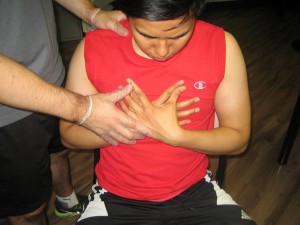Pericarditis involves inflammation of the pericardium. The condition is generally acute where it develops abruptly and can last for up to several months. The membrane surrounding the heart might appear red and swollen. Oftentimes, excess fluid forms in the region amidst the pericardial layers and result to pericardial effusion.
Indications
The chest pain symptoms that are linked with pericarditis can be described as:
- Stabbing and sharp (this is due to the rubbing of the heart against the pericardium)
- Discomfort is aggravated by swallowing, coughing, lying flat or deep breathing
- Relieved by leaning forward or sitting up
The other symptoms that might arise include a dry cough, fatigue or anxiety, difficulty breathing while lying down and pain in the neck, back or left shoulder. - Individual has a need to bend over or hold the chest to comfortably breathe
The other symptoms that might arise include a dry cough, fatigue or anxiety, difficulty breathing while lying down and pain in the neck, back or left shoulder.
What are the causes?
There are various causes of pericarditis but it is often a complication of a viral ailment, usually the gastrointestinal virus.
Other causes include the following:
- Bacterial infection
- Fungal infection
- Parasitic infection
- Some autoimmune diseases such as rheumatoid arthritis, lupus and scleroderma
- Chest injuries from a vehicular accident
- Other medical conditions such as kidney failure, tumors or hereditary ailments such as familial Mediterranean fever
- Certain medications that suppress the immune system
The risk for the condition is higher after undergoing a heart surgery, heart attack, percutaneous treatment such as cardiac catheterization or radiation therapy.
Management of pericarditis
The treatment for an acute case might include medications for the pain and inflammation such as non-steroidal anti-inflammatory drugs (NSAIDs) particularly ibuprofen in high doses. Depending on the cause, the doctor might prescribe an antibiotic or antifungal medication.
In case the symptoms last longer than 2 weeks or recur after a few months, the doctor might prescribe an anti-inflammatory drug specifically colchicine along with ibuprofen.

